
The long and wearying road to the 2020 presidential election begins in earnest this week as twenty of the twenty-four Democratic candidates face off over two debate nights (the comically historically large field has been split up across Wednesday and Thursday, with each night featuring two randomly-selected slates of ten). Of course, a majority of these hopefuls don’t have a snowball’s chance in hell of clinching the nomination, and have declared, I presume, in order to audition for the VP role, secure a future cabinet position, or simply enhance their national profile. Having said all that, Trump was a grotesque sideshow rank outsider in a similarly crowded Republican field back in 2015, and now he’s the most powerful man in the world. Isn’t life funny?!
Anyway, tonight’s debate will feature Elizabeth Warren, Beto O’Rourke, New Jersey Sen. Cory Booker, Minnesota Sen. Amy Klobuchar, Washington Gov. Jay Inslee, former HUD Secretary Julián Castro, Hawaii Rep. Tulsi Gabbard, New York City Mayor Bill de Blasio, Ohio Rep. Tim Ryan and former Maryland Rep. John Delaney. Thursday’s will see pack leader Joe Biden squaring off against Bernie Sanders; California Sen. Kamala Harris; South Bend, Ind., Mayor Pete Buttigieg; New York Sen. Kirsten Gillibrand; Colorado Sen. Michael Bennet; former Colorado Gov. John Hickenlooper; California Rep. Eric Swalwell; entrepreneur Andrew Yang, and self-help author Marianne Williamson.
Four other candidates—Montana Gov. Steve Bullock; Massachusetts Rep. Seth Moulton; Miramar, Fla., Mayor Wayne Messam; and former Alaska Sen. Mike Gravel—failed to meet minimum criteria and will have to settle for hurling insults and accusations at one another on Twitter like the rest of us.
It may surprise you to learn that the majority of these candidates are also published authors. Yes, all but a lazy few (I’m looking at you, Bill) have written political memoirs/extended mission statements over the past few years, and in feverish anticipation of tonight’s opening debate we thought we’d take you on a whistle stop tour of every damn one of ’em. Below, you’ll find each candidate’s inspirational treatise on why they (and only they) can save America, cruelly listed in order of how well they’re polling right now, from Promise Me, Dad by Joe Biden (31%) all the way down to A Politics of Love by Marianne Williamson (>1%).
But first, some awards:
Best Title: The Truths We Hold: An American Journey by Kamala Harris (Succinct, mildly stirring. This is as good as they get I’m afraid.)
Worst Title: The Opposite of Woe: My Life in Beer and Politics by John Hickenlooper (You’re running for president of the country, John, not a fraternity.)
Most Poetic Title: Land of Flickering Lights: Restoring America in the Age of Broken Politics by Michael Bennett (This has a sort of Eagles/Springsteen quality to it—you know, poetry)
Most Misleading Title: Is Today the Day?: Not Another Political Memoir by Tulsi Gabbard (…pretty sure it is gonna be another political memoir tho…)
Longest Title: Dealing Death and Drugs: The Big Business of Dope in the U.S. and Mexico : an Argument for Ending the Prohibition of Marijuana by Beto O’Rourke (Brevity is for Boomers!)
Number of books with the word ‘America’ in the title: 9
Number of books with the word ‘beer’ in the title: 1
Candidates who have shamefully neglected to write books, thereby dooming their campaigns: Bill de Blasio, Eric Swalwell
*
Promise Me, Dad: A Year of Hope, Hardship, and Purpose by Joe Biden (2017)
“Promise Me, Dad is Joe Biden’s poignant, instructive and deeply affecting account of a family’s struggle against a vicious brain cancer, played out against the demands of his job as vice president and the temptations of another run for the presidency. It is also a touching account of the cruel realities of cancer, especially cancer that strikes a child.”
–Tom Brokaw (The Washington Post)
“Joe Biden’s memoir Promise Me, Dad is many things. It is a snapshot of a painful period of Biden’s life, as his son, Beau, fights a highly aggressive form of brain cancer and eventually dies in June of 2015. It’s a powerful look at how illness and bereavement can permeate every facet of a politician’s personal and professional life … emblematic of the qualities that made Biden a popular vice president: his ability to empathize, particularly when discussing grief; the fact that he really seems to give a damn … ends with Biden laying out how he would have run in the 2016 election—and there’s not much that’s small about it … there are long chunks of this book that suggest that Biden is more out of touch with the Democratic Party than he thinks.”
–Alex Shephard (The New Republic)
Where We Go From Here: Two Years in the Resistance by Bernie Sanders (2018)
“… an informative combination history of the progressive movement during the last two years and political manifesto … [Sanders] is prone to repeating pithy talking points, such as that the U.S. spends more on its military than the next 10 countries combined. Despite a diary-like structure, this book is political, not personal; just like Sanders’s presidential bid, it’s not about his experience but about the movement he wants to represent.”
“… Where We Go From Here is unmistakably a campaign book, which means that, like almost all campaign books, it is boring … Where We Go From Here is slightly more interesting than most campaign books because Bernie Sanders is slightly more interesting than most candidates for president … Otherwise, Where We Go From Here is just what you might expect. His platforms are presented but not interrogated. There are stances, but few real questions and little self-reflection. But light deception, overblown rhetoric, and the urge to find blame everywhere but in your own campaign are not unique to Sanders: they are hallmarks of this genre.”
–Annalisa Quinn (NPR)
This Fight is Our Fight: The Battle to Save America’s Middle Class by Elizabeth Warren (2017)
“Yes, what Warren is preaching sounds very much like the second coming of the New Deal—as she herself acknowledges…But: Warren brings an edge to her advocacy that many Democrats have shied away from, at least until recently. Even the Obama administration, while doing much more to fight inequality than many realize, balked at making inequality reduction an explicit goal … This Fight Is Our Fight is a smart, tough-minded book. But is it an effective blueprint for progressive political revival? The evidence suggests that it’s incomplete.”
–Paul Krugman (The New York Times Book Review)
“Girded for battle, the senior senator from Massachusetts forcefully lays out the bleak picture of an American government increasingly controlled by corporate greed and special interests … Warren’s education in maneuvering through the powers that be is eye-opening, and she shares her experiences with grim frankness … The author sounds the alarm that an oligarchy is in the making, and her urgency is palpable and necessary. Inspiring words to empower Warren’s marching army.”
Shortest Way Home: One Mayor’s Challenge and a Model for America’s Future by Pete Buttigieg (2019)
“…his candid discussion of what it’s like to come out as gay while serving as a small-city mayor and, especially, his warm and engagingly hokey description of falling in love with the man who would become his husband break important new ground in a pre-presidential autobiography … And in [Buttigieg’s] description of his military service in Afghanistan as a Navy Reservist, the lack of drama is admirable. He identifies himself with the rank-and-file; there is no puffed-up heroism here. He is, however, properly critical of the failure of those who share his elite educational pedigree to join the military in a time of war … these pages make a pretty good case that city halls just might be better training schools for the presidency than attendance at any five years of congressional hearings combined.”
–E.J. Dionne Jr. (The Washington Post)
“Shortest Way Home is a story of changing minds by focusing on the local, the interpersonal, and the everyday. It is a seductive notion, especially filtered as it is through the good-natured humor and obvious love for his home city that animates Buttigieg’s prose. Yet a campaign memoir is a political proposal as much as it is a work of literature, and the narrative is at its thinnest where it draws the proposal’s contours. Buttigieg’s vision for an equitable society…reads as vague and academic, notably out of keeping with the practical granularity of other examples of his governing philosophy … Readers looking for radical politics or concrete solutions in the pages of Shortest Way Home may be disappointed … To read Shortest Way Home is to experience a profoundly millennial product, one that paints a starkly different reality and vision than the one on offer from boomers who currently have a death grip on the government’s reins.”
–Peggy O’Donnell (The Los Angeles Reviews of Books)
The Truths We Hold: An American Journey by Kamala Harris (2019)
“As is the pattern in these books, Harris braids together the personal and the political—readers might find themselves tempted to skim through what feels like a campaign speech to return to a life story that genuinely entrances. But that would be a mistake; Harris provides a very clear picture of the kind of leader she hopes to be, as well as the way her mind works when she confronts various issues, including crime, healthcare and foreign policy … Throughout, there are unmistakable echoes of the kind of inclusive tone often struck by former President Obama.”
–Kate Tuttle (The Los Angeles Times)
“…unlike Harris’s many viral #resistance moments and meticulous snapshots of relatability, the memoir itself is a meandering work that lacks verve. More significantly, given far more than 280 characters to deliver a cohesive message, Harris doesn’t meaningfully reconcile her punitive track record as a California prosecutor with her more recent activist-adjacent positioning as a national Democratic darling … The book offers anecdotes meant to endear her to a diverse (or #woke) readership as well as glimpses into Harris’s political worldview; the resultant mix is somewhat muddled … The Truths We Hold, by contrast [to ], lacks the literary finesse that distinguished Obama as a memoirist and endeared him to voters. Instead of weaving a political vision into the biography of its author, it assembles itself rather like a campaign pamphlet … For those already inclined to find her highly tweetable brand of #resistance rhetoric appealing, the memoir offers up palatably anti-establishment quotes for possible tote-bag screen-printing. If only it presented a holistic political foundation instead.”
–Hannah Giorgis (The Atlantic)
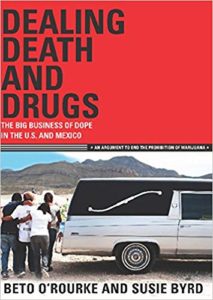
Dealing Death and Drugs: The Big Business of Dope in the U.S. and Mexico : an Argument for Ending the Prohibition of Marijuana by Beto O’Rourke and Susie Byrd (2011)
“…the two El Paso natives outline the drug war’s effects on their city and their sister city, Ciudad Juárez. Beginning with a history of the Juárez-El Paso smuggling corridor, the authors follow the evolution from the mom-and-pop operations of the prohibition era to the horrific cartel warfare of the past few years. They also highlight the tragic consequences of strict enforcement of marijuana laws, not only for the hundreds of thousands of Mexican families caught in the violence but also for American communities (especially minority-dominant ones) torn apart by illegal markets and widespread incarceration. They rightfully challenge two common myths: that marijuana is a gateway drug, and that price increases lower use … Whatever your take, it is refreshing to see a real debate about drug use and policy by someone who is and will be involved in making these types of policies. I hope it continues when O’Rourke joins the 113th Congress.”
–Shannon K. O’Neill (Council on Foreign Relations Blog)
United: Thoughts on Finding Common Ground and Advancing the Common Good by Cory Booker (2016)
“Booker in particular as a book presented all the face-down literary comfort potential of a bed of punji stakes … it’s good. It’s an exceedingly good book, and an important book, and a reminder of what makes Booker an important and, through it all, a promising public figure … he gives us not simply the standard slingshot of self-love that usually characterizes these kinds of political books. He actually populates the book with real people and big-picture relevant plot lines … All the portraits create a vital story line—and an activist’s political narrative … Based on Booker’s selfie-snapping spree and reluctance to ever step away from predictable sound bites, we feared a book that indulges in all the same stretched safety nets of establishment flatness. But what makes the book fine ultimately is its gritty reliance on local people and encounters to demonstrate a story for the country right now.”
“… highly readable and engaging … Whether readers agree or disagree with the senator’s politics, his titular appeal for Americans to recognize their history of interdependence and to work to improve the lives of others is hard to dispute … Booker’s book will likely interest and inspire not only his constituents but also a range of U.S. readers, especially those concerned with the criminal justice system and the current state of partisan politics.”
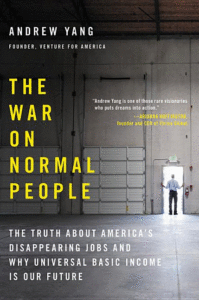
The War on Normal People: The Truth About America’s Disappearing Jobs and Why Universal Basic Income is Our Future by Andrew Yang (2019)
“Several recent books have provided good background briefings for what a U.B.I. [universal basic income] could be … To these offerings, Andrew Yang, an entrepreneur, adds his own, somewhat breathless version in The War on Normal People. Annie Lowrey, a contributing editor for The Atlantic, provides a similarly upbeat, although more measured, assessment in Give People Money. Both are useful primers on the case for a U.B.I. The two books cover so much of the same terrain that I’m tempted to wonder whether they were written by the same robot, programmed for slightly different levels of giddy enthusiasm … Yang suggests it would spur a system of ‘social credits’ in which people trade their spare time by performing various helpful tasks for one another … A core challenge in the future will be how to redistribute money from the ever richer owners of the robots and related technologies to the rest of us, who are otherwise likely to become poorer and less secure … Sadly, neither of these authors discusses how to deal with this paradox.”
–Robert B. Reich (The New York Times Book Review)
“The author’s support of a guaranteed basic income is just one aspect of a platform to fend off that bleak future. He also looks at such things as the ‘social credit’ system of bartering goods and services and reforming the higher education system to ‘teach and demonstrate some values.’ Longer on description than prescription but a provocative work of social criticism.”
The Senator Next Door: A Memoir From the Heartland by Amy Klobuchar (2015)
“… [Klobuchar] talks about the events and people that shaped her political beliefs, with some disarmingly funny and honest asides … hews to a narrative about overcoming economic adversity—which speaks to her positions on reforming health care and fighting for the middle class, for instance—rather than overcoming sexism … reflects both the gains of women in politics in recent decades, and the evolving strategies women politicians are now embracing to build on those gains … we need more politicians like Klobuchar—who can tell their stories energetically and with humor, presenting themselves as dynamic public figures, rather than boxing themselves into ‘The Woman Candidate’ category.”
–Laura Reston (The New Republic)
“…not a particularly exciting read, but it does serve as an apt reminder that some decency remains in American politics … Klobuchar’s stories are carefully positioned (unsurprisingly for a sitting politician) to be both accessible and carry the ring of authenticity while appealing to a broad spectrum of political affiliations. Her even-handedness could be cynically perceived as playing to the middle, but it sounds refreshingly genuine. Readers will come away feeling a bit more positive about the political system and the people working within it.”
An Unlikely Journey: Waking Up From My American Dream by Julián Castro (2018)
“There are many interesting threads in Castro’s book, but little in the way of introspection. In the first half, especially, which covers his childhood, many anecdotes seem presented for dramatic effect, and their purpose in the larger story never becomes clear … How he resolves his vision of education as an equalizer with barriers like structural racism remains unclear … raises more questions than answers. Does he embrace a minority and immigrant identity, or hope to “transcend” it in favor of something more vaguely universal? Does a presidential story need to start in America to be valid? And most important, has he truly woken up from the American dream of meritocracy?”
–Concepción de León (The New York Times Book Review)
“Eloquent in its simplicity, Castro’s book offers a moving account of immigrant success that seeks to encourage all Americans to continue the fight against government injustice toward immigrants … A timely, inspiring memoir.”
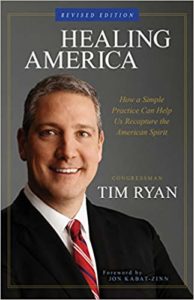
Healing America: How a Simple Practice Can Help Us Recapture the American Spirit by Tim Ryan (2018)
“This book makes mindfulness very approachable, with no specific religious affiliations, although Tim Ryan does seem to like to mention Jesus—perhaps just for wider popular appeal in his intended audience. If that doesn’t bother you every couple of chapters, his tone of friendly sincerity, cutting to the chase without too many emotional appeals, and genuinely selfless care for the American everyman make the book an enjoyable read. And the book makes quite a convincing case for mindfulness as a practice that could improve America. That said, what wouldn’t improve America these days? amiright?”
–Amber Tucker (Goodreads…)
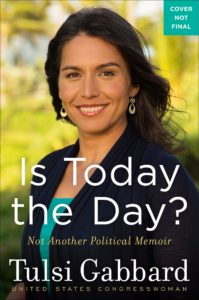
Is Today the Day?: Not Another Political Memoir by Tulsi Gabbard (2021)
For some reason, aspiring 2020 presidential election candidate Tulsi Gabbard is waiting until after the 2020 presidential election to release her (not another) political memoir. It’s a bold strategy from the Hawaii Rep., let’s see if it pays off.
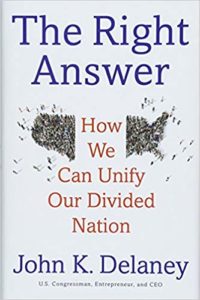
The Right Answer: How We Can Unify Our Divided Nation by John K. Delaney (2018)
“Maryland Democratic Congressman Delaney’s summary of the reasons why he should become the next president of the United States is a stereotypical volume, containing the usual blend of biography (including shoutouts to his hardworking immigrant ancestors and his beloved wife), professional resume, and policy prescriptions. Although many voters would probably be sympathetic to Delaney’s overarching theme that progress on tough issues requires bipartisanship, he provides little reason to believe that the current atmosphere of hyper-partisanship could change soon and minimizes the split on major issues … Uncontroversial generalizations and stock campaign phrases (‘Let’s work together toward a common goal for the common good’) overwhelm Delaney’s impressive track record as a businessman and his refreshing approach to reaching across the aisle, which included one-on-one sit-downs with many colleagues to advocate for legislation. The result is a bland mix of largely uncontroversial points that goes out of its way, sometimes to the point of inaccuracy, to avoid offending anyone.”
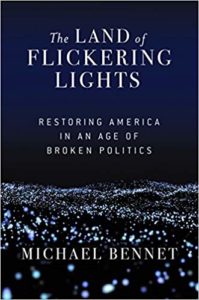
Land of Flickering Lights: Restoring America in the Age of Broken Politics by Michael Bennett (2019)
“…the Democratic senator from Colorado has not written a typical, triumphal campaign memoir. Instead, the book reads like a sweeping diagnosis of the nation’s political ills (which include, in Bennet’s view, a desperate aversion to bipartisan discussion and a crippling reliance on short-term thinking), stitched together with assurances that room for redemption still exists … The centrist Bennet, a 2020 long shot for president, is not well known, but he does not use the book to explicitly plug himself, and his personal history and observations are sprinkled only lightly throughout it … Bennet insists he’s talking about profound collaboration and understanding among citizens, not flimsy handshakes between parties, and he did not set out to write a policy manual. His stories effectively lay the groundwork for the Franklin D. Roosevelt-inspired ‘four freedoms’ he ultimately proposes. Bennet writes of a ‘freedom to rise’ (valuing upward mobility); a ‘freedom to learn’ (including a modern education system); a ‘freedom from violence’ (including an equitable criminal justice system); and a ‘freedom to govern ourselves’ (which covers fair voting rights).”
–Gabriel Debenedetti (The New York Times Book Review)
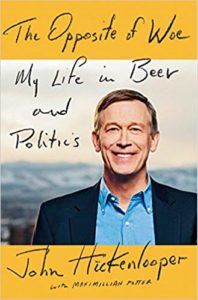
The Opposite of Woe: My Life in Beer and Politics by John Hickenlooper (2016)
“When politics takes over the story, we’re in the familiar, dreary territory taken up with bouquets to supporters and subordinates, tributes to gritty and resilient constituents, electoral obstacles overcome, problems solved, and controversial issues confronted—in Hickenlooper’s case, fracking, same-sex unions, legalizing marijuana, and capital punishment. The author emerges with pretty high marks, but we’re inclined to credit him because of the apparent honesty he brings to his public career … Hickenlooper recounts his troubled boyhood, his peripatetic and protracted academic career—he’s the only Wesleyan student ever to receive “tenure”—his checkered love life, his (largely failed) artistic ambitions and endeavors, his dabbling in real estate, his mostly unsatisfying stint as a geologist, and his wildly successful run as a brewpub entrepreneur. All this entertains wonderfully: the brushes with the famous—Yoko Ono, Phil Donahue, etc.—the colorful anecdotes about the campaign to save ‘Mile High,’ the beer label authored by Kurt Vonnegut, the Quaker ancestor who was also a brewer. Hickenlooper draws an analogy between brewing and politics (the activist as yeast, the political leader as brewer), but however apt that metaphor, it’s difficult to imagine a more unusual preparation for public life than the one ably recounted here.”
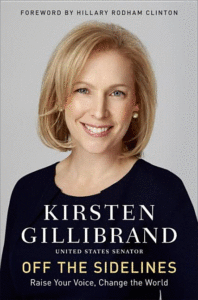
Off the Sidelines: Speak Up, Be Fearless, and Change Your World by Kirsten Gillibrand (2014)
“In some ways, the measure of a good political autobiography—which almost invariably is a campaign document masquerading as a reminiscence—boils down to its ratio of originality to bromides. Kirsten Gillibrand’s Off the Sidelines, though, is an interesting case, because it ticktocks in perfect 4/4 time between the two, often on the same page, which means one is never quite sure whether to applaud New York’s junior senator for her honesty or toss tomatoes in irritation. There are stretches so platitudinous that it’s almost impossible not to hear blah blah BLAH blah Blaaaaaaaaaaah chiming in one’s head: ‘I’m a big believer in making your own luck.’ Then there are moments of immensely appealing self-disclosure that seldom appear in other books of this genre: ‘I was a slightly straighter arrow than my mother. O.K., I was a massive kiss-ass and lived for positive reinforcement.’ Though Off the Sidelines is obviously a political book, it’s not a book only about politics. Gillibrand’s legislative career is still embryonic, insufficient for a whole volume, which means we get a fusion dish: a campaign biography wrapped in a Lean In shell with an Oprah toothpick stuck through.”
–Jennifer Senior (The New York Times)
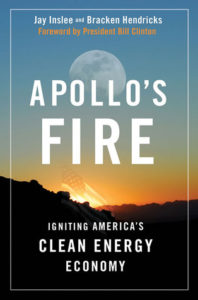
Apollo’s Fire: Igniting America’s Clean Energy Economy by Jay Inslee (2010)
“His first-person anecdotes lighten this otherwise earnest book, based on initiatives of the Apollo Alliance, an advocacy group and think tank uniting unions, environmental groups and business organizations committed to fostering a “green economy.” Redesigning the car, investing in solar power, mining wind for power, exploring the nascent technology of “wave energy,” using energy more efficiently and working clean coal and safe nuclear power into the equation are among the authors’ prescriptions. Inslee is primary congressional sponsor of the New Apollo Energy Act and on the Apollo Alliance advisory board; coauthor Hendricks is a member of the alliance’s steering committee. A brief foreword by Bill Clinton waxes enthusiastic about the synergy between the book, the alliance and the proposed legislation.”
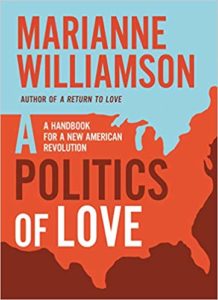
A Politics of Love: A Handbook for a New American Revolution by Marianne Williamson (2019)
“Unfortunately, A Politics of Love reads like the kind of writing it is: a lofty campaign speech. Williamson seems to grasp the many existential crises bearing down on the future. To her credit, she is among too few candidates willing to acknowledge explicitly enough that climate change is a threat to not-so-long-term human survival. However, her explanations of how American politics is lacking love among the population or how to make love a political force are vague … In addition to her willingness to acknowledge climate change as a threat to sustainable human life, to her credit, Williamson also has useful thoughts on reparations and education. But overall, her analyses of the political climate, the history of American imperialism and democracy, and her proposed solutions (or lack thereof) are built on contradictory platitudes and romanticized references to the history of corporate American politics.”
–Matthew Vernon Whalan (The New York Journal of Books)

